Sunday 8 September 1940
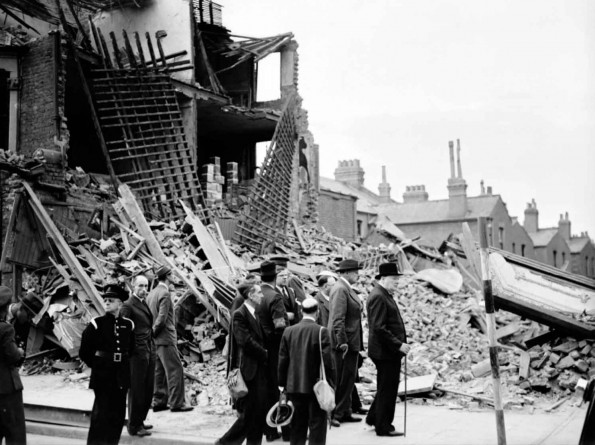 |
| Prime Minister Winston Churchill tours bomb damage in London, 8 September 1940. |
British Military: The codeword "Cromwell" remains in effect on 8 September 1940, indicating that a German invasion is imminent. Unfortunately, the meaning of the codeword is not understood by everyone. During September 7th, poorly trained local Home Guard commanders around the country begin taking extreme actions as if the codeword means that the Germans are on the beaches already. This includes ringing church bells - an accepted signal of enemy troops in the vicinity - and other crazy stuff like shooting at innocent passing cars. Other troops who hear the church bells assume that this mistaken bell-ringing is confirmation of an invasion in progress, so they set their own extreme plans in motion. A vast chain-reaction spreads across the country. Some Home Guard forces lay unmarked minefields at strategic spots, and three Guards officers drive over such a field in Lincolnshire and are killed. Several East Anglian bridges are blown up to prevent their "capture." The chaos peaks during the night of the 7th-8th and is slowly brought under control during the day as the BBC spreads the word that all is well.
Air Marshal Hugh Dowding continues his triage operations on RAF Fighter Command. While rational and productive, these decisions exacerbate political issues within the RAF. Along with Vice Air Marshal Keith Park in command of Fighter Command in southeast England, Dowding is no fan of the "Big Wing" concept preferred by Air Vice Marshal Leigh-Mallory of No. 12 Group. That tactic has been proven time and again to take too long to assemble the formations, during which time the Luftwaffe accomplishes its objectives and leaves before the fighters can arrive. It is very similar to the divisions between the "battleship Admirals" and the "airpower Admirals." However, Dowding is unable to kill the idea because Leigh-Mallory is backed by the Air Ministry.
However, Dowding can help Park in other ways. He decides that Park may have the pick of experienced fighter pilots throughout the RAF for his No. 11 Group despite the effects this may have on other units and pilot development. Basically, Park is allowed to cherry-pick pilots from other units to fill gaps in his own. This decision increases the political frictions within the uppermost echelons of the RAF which have been boiling over recently.
Park leads from the front. During the morning, when things are quiet, he flies his own Hurricane over London. He shrewdly notes that, while the scene is one of horror, it contains the seeds of ultimate victory:
In vastly oversimplified terms, there now are two power blocks at war within the RAF: Dowding and Park, attuned to the needs of the moment, versus the old guard of the Air Ministry and Leigh-Mallory (among others), anxious to preserve their power and prestige. One side or the other ultimately must prevail, because they cannot coexist indefinitely. Decisions made now will affect the careers of the parties involved, but not until the battle is decided. These folks all hold grudges, regardless of what their public statements or official histories may indicate.
Battle of Britain: German bombers remain over London through much of the night. Londoners spend a restless night in shelters, including the subway Tubes, and emerge in the morning to inspect the damage.
The East End and the docks on the southern shore of the Thames have been hit the hardest. The major docks (Royal Albert, Queen Victoria, King George V, St. Katherine's) are ablaze, with half-sunken ships all along the waterfront. There are fires in outlying residential areas that send huge columns of smoke into the air, and many people who stumble home to their homes find them obliterated or ablaze. In many ways, for many people, it feels like the first day of the real war.
The Luftwaffe only sends over reconnaissance flights during the morning. Then, at 11:30, a formation of Dornier Do 17s escorted by JG 2 and JG 53 attacks RAF Detling and West Matting. The bombers do not get through to London, and many drop their bombs in the countryside or other random spots. The vast majority of RAF airfields are undisturbed.
At dusk, another bomber raid heads toward London. At 19:30, Sperrle's Luftflotte 3 sends its medium bombers across Shoreham. The timing is impeccable, as it is too late for Fighter Command to send up its day fighters. This raid by 250 bombers drops its bombs on the docklands and surrounding areas, interrupted only by anti-aircraft fire. The attacks continue into the night, and the fires blazing in London serve as a beacon to the Luftwaffe navigators. The bombs drop on a more dispersed part of London than on the previous night, with residential areas receiving more attention. The railways are especially hard-hit, with a train destroyed at Victoria Station and lines closed in several places due to unexploded bombs.
In an infamous incident, a direct hit on a shelter at the Peabody Estate, Whitechapel kills 78 people, including entire families.
Civilian deaths during the night of 8/9 September total 412, with 747 other casualties. The Luftwaffe loses about 25 planes and the RAF only 6. Most importantly for the future conduct of the battle, the RAF has another day to repair its vital airfields and other infrastructure necessary to fight the Luftwaffe in the air. It is like a boxer, having staggered his opponent, suddenly going off to shout at the other boxer's manager. It may feel good... but it allows the man on the ropes to recover. Everyone in the RAF sees this at the time, but apparently, nobody in the Luftwaffe does.
With invasion fears at a fever pitch, Royal Navy cruiser HMS Aurora leads a small flotilla that shells German barges at Boulogne harbor, France. Cruiser HMS Galatea leads a similar flotilla to Calais, but finds no ships and thus does not fire its guns. As the Galatea withdraws, it hits a mine which causes serious damage and lays the ship up in drydock for months.
Oberleutnant Ulrich Steinhilper of I,/JG52 is leading a group of new pilots in a training mission on the French coast when he spots a Hawker Hurricane flying nearby. He attacks it to demonstrate a good attack technique to his charges. The Hurricane turns out to be a Bf 109 flown by Kommandeur of JG 26 Adolf Galland which Steinhilper has misidentified (Galland is known for engaging in solo flights). Galland, who doesn't particularly care for radios in fighter planes (too heavy and unnecessary in his opinion), uses his to warn Steinhilper off at the last minute with bullets flying around him.
Oberleutnant Helmut Wick of 6,/JG 2 gainst his 28th victory.
European Air Operations: RAF Bomber Command attacks the usual airfields in northwest Europe, shipping (barges) at Ostend and Boulogne, and the northern German ports of Hamburg, Emden, and Bremen. The priority at this point, in line with the overall British effort, has shifted from industrial targets of strategic impact deep within Europe to the more immediate tactical concerns of an imminent invasion.
Battle of the Atlantic: After dark, British torpedo boats MTB-14, MTB-15 and MTB-17, based at Dover, attack a German convoy of about 30 small vessels in the vicinity of Ostend. Two of the boats, MTBs 15 and 17, enter the harbor itself during an RAF raid and launch torpedoes. They claim to have hit two vessels and to have sunk a Kriegsmarine ammunition ship, but the identity of the ship(s) they hit is unknown. If indeed it happened as claimed, the mission is the first successful MTB attack of the war.
German raider Widder (Captain Ruckteschell) stops 5866 ton Greek collier Antonios Chandris in the Central Atlantic, 500 miles from land. The Greek crew is told to disembark, and Ruckteschell sinks it at dawn on the 9th. The crew of 22 neutrals drifts for 31 days at sea before being found 1400 miles away by a Portuguese freighter.
The Luftwaffe damages more freighters tied up along the London docks, approximately four in all.
The Luftwaffe also attacks the port of Methil. One torpedo hits sloop HMS Stork in Methil Roads, causing extensive damage to the stern and one casualty. Dutch 8501 ton freighter Stad Vlaardingen also is damaged at a nearby location.
Italian submarine Faa Di Bruno reports making an unsuccessful attack on a tanker.
At Kiel, the battleship Bismarck gets some target practice when she again opens fire with her anti-aircraft guns against RAF bombers. She fires 72 3.7cm and 65 2cm shells but misses the bombers.
In Operation Hannelore, German torpedo boats lay mines off Dover in preparation for Operation Sealion.
Convoy OA 211 departs from Methil, Convoy OB 210 departs from Liverpool.
Minesweepers HMS Fermoy and Fellowship succeed in their special ops mission of cutting the Italian communications cable between Syracuse and Tripoli.
It is Malta's National Day. Lord Lloyd, Secretary of State for the Colonies, broadcasts an appeal to the islanders:
Italian Military: Italian Duce Benito Mussolini is furious that the offensive in Libya that he wished to begin in early August still is not happening. He orders Marshal Rodolfo Graziani to attack by the 9th or face dismissal. Graziani, new to his post, has much less prestige than his predecessor (killed in an air crash over the summer) and no leverage. He realizes, however, that his forces, while numerically superior to the British forces on the frontier, are vastly inferior on a qualitative basis.
US Military: The Greenslade Board departs from Hamilton, Bermuda after inspecting the new US base there, granted by the British in the "destroyers for bases" deal. It now heads back to Norfolk, Virginia.
Kingdom of Mysore: 21-year-old Jayachamarajendra Wadiyar is the new Maharaja of the Kingdom of Mysore (southern India). His father, Krishnaraja IV, has been progressive and worked with the British. Even Mahatma Gandhi has praised Krishnaraja as a "saintly king" for his progressive efforts in education and infrastructure. One could call the dynasty "Anglophiles." Mysore is a key element in the British administration of India, whose politics are very much in flux.
British Homefront: The government proclaims a national day of prayer.
Future History: Ulrich Steinhilper never became a top fighter pilot, but in the 1950s he achieved recognition in another line of work. He is credited with coming up with the phrase "word processing" (in German) while working for IBM Germany. Although apparently the phrase previously had been used here and there in the English language, Steinhilper's usage led to its mass acceptance and popularization. If anyone can be credited with coming up with the phrase, it is Steinhilper. IBM eventually rewarded him with an around-the-world cruise.
September 1940
September 1, 1940: RAF's Horrible Weekend
September 2, 1940: German Troopship Sunk
September 3, 1940: Destroyers for Bases
September 4, 1940: Enter Antonescu
September 5, 1940: Stukas Over Malta
September 6, 1940: The Luftwaffe Peaks
September 7, 1940: The Blitz Begins
September 8, 1940: Codeword Cromwell
September 9, 1940: Italians Attack Egypt
September 10, 1940: Hitler Postpones Sealion
September 11, 1940: British Confusion at Gibraltar
September 12, 1940: Warsaw Ghetto Approved
September 13, 1940: Zeros Attack!
September 14, 1940: The Draft Is Back
September 15, 1940: Battle of Britain Day
September 16, 1940: italians Take Sidi Barrani
September 17, 1940: Sealion Kaputt
September 18, 1940: City of Benares Incident
September 19, 1940: Disperse the Barges
September 20, 1940: A Wolfpack Gathers
September 21, 1940: Wolfpack Strikes Convoy HX-72
September 22, 1940: Vietnam War Begins
September 23, 1940: Operation Menace Begins
September 24, 1940: Dakar Fights Back
September 25, 1940: Filton Raid
September 26, 1940: Axis Time
September 27, 1940: Graveney Marsh Battle
September 28, 1940: Radio Belgique Begins
September 29, 1940: Brocklesby Collision
September 30, 1940: Operation Lena
2020
Air Marshal Hugh Dowding continues his triage operations on RAF Fighter Command. While rational and productive, these decisions exacerbate political issues within the RAF. Along with Vice Air Marshal Keith Park in command of Fighter Command in southeast England, Dowding is no fan of the "Big Wing" concept preferred by Air Vice Marshal Leigh-Mallory of No. 12 Group. That tactic has been proven time and again to take too long to assemble the formations, during which time the Luftwaffe accomplishes its objectives and leaves before the fighters can arrive. It is very similar to the divisions between the "battleship Admirals" and the "airpower Admirals." However, Dowding is unable to kill the idea because Leigh-Mallory is backed by the Air Ministry.
However, Dowding can help Park in other ways. He decides that Park may have the pick of experienced fighter pilots throughout the RAF for his No. 11 Group despite the effects this may have on other units and pilot development. Basically, Park is allowed to cherry-pick pilots from other units to fill gaps in his own. This decision increases the political frictions within the uppermost echelons of the RAF which have been boiling over recently.
Park leads from the front. During the morning, when things are quiet, he flies his own Hurricane over London. He shrewdly notes that, while the scene is one of horror, it contains the seeds of ultimate victory:
It was burning all down the river. It was a horrid sight. But I looked down and said "Thank God for that," because I knew that the Germans had switched their attack from the fighter stations thinking that they were knocked out. They weren't, but they were pretty groggy.”He concludes that Hermann Goering has made a huge error in allowing the fighter bases to recover. In effect, quite unintentionally, Fighter Command has duped the Germans into thinking it was dead by playing possum.
In vastly oversimplified terms, there now are two power blocks at war within the RAF: Dowding and Park, attuned to the needs of the moment, versus the old guard of the Air Ministry and Leigh-Mallory (among others), anxious to preserve their power and prestige. One side or the other ultimately must prevail, because they cannot coexist indefinitely. Decisions made now will affect the careers of the parties involved, but not until the battle is decided. These folks all hold grudges, regardless of what their public statements or official histories may indicate.
 |
| Air Vice-Marshal Keith Rodney Park, a native of New Zealand. |
The East End and the docks on the southern shore of the Thames have been hit the hardest. The major docks (Royal Albert, Queen Victoria, King George V, St. Katherine's) are ablaze, with half-sunken ships all along the waterfront. There are fires in outlying residential areas that send huge columns of smoke into the air, and many people who stumble home to their homes find them obliterated or ablaze. In many ways, for many people, it feels like the first day of the real war.
The Luftwaffe only sends over reconnaissance flights during the morning. Then, at 11:30, a formation of Dornier Do 17s escorted by JG 2 and JG 53 attacks RAF Detling and West Matting. The bombers do not get through to London, and many drop their bombs in the countryside or other random spots. The vast majority of RAF airfields are undisturbed.
At dusk, another bomber raid heads toward London. At 19:30, Sperrle's Luftflotte 3 sends its medium bombers across Shoreham. The timing is impeccable, as it is too late for Fighter Command to send up its day fighters. This raid by 250 bombers drops its bombs on the docklands and surrounding areas, interrupted only by anti-aircraft fire. The attacks continue into the night, and the fires blazing in London serve as a beacon to the Luftwaffe navigators. The bombs drop on a more dispersed part of London than on the previous night, with residential areas receiving more attention. The railways are especially hard-hit, with a train destroyed at Victoria Station and lines closed in several places due to unexploded bombs.
In an infamous incident, a direct hit on a shelter at the Peabody Estate, Whitechapel kills 78 people, including entire families.
Civilian deaths during the night of 8/9 September total 412, with 747 other casualties. The Luftwaffe loses about 25 planes and the RAF only 6. Most importantly for the future conduct of the battle, the RAF has another day to repair its vital airfields and other infrastructure necessary to fight the Luftwaffe in the air. It is like a boxer, having staggered his opponent, suddenly going off to shout at the other boxer's manager. It may feel good... but it allows the man on the ropes to recover. Everyone in the RAF sees this at the time, but apparently, nobody in the Luftwaffe does.
With invasion fears at a fever pitch, Royal Navy cruiser HMS Aurora leads a small flotilla that shells German barges at Boulogne harbor, France. Cruiser HMS Galatea leads a similar flotilla to Calais, but finds no ships and thus does not fire its guns. As the Galatea withdraws, it hits a mine which causes serious damage and lays the ship up in drydock for months.
Oberleutnant Ulrich Steinhilper of I,/JG52 is leading a group of new pilots in a training mission on the French coast when he spots a Hawker Hurricane flying nearby. He attacks it to demonstrate a good attack technique to his charges. The Hurricane turns out to be a Bf 109 flown by Kommandeur of JG 26 Adolf Galland which Steinhilper has misidentified (Galland is known for engaging in solo flights). Galland, who doesn't particularly care for radios in fighter planes (too heavy and unnecessary in his opinion), uses his to warn Steinhilper off at the last minute with bullets flying around him.
Oberleutnant Helmut Wick of 6,/JG 2 gainst his 28th victory.
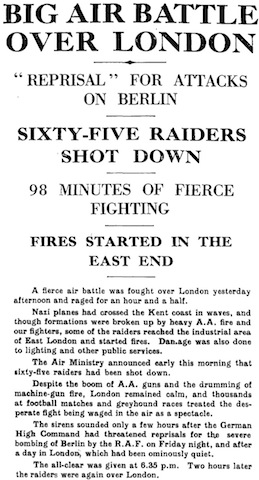 |
| The Observer, 8 September 1940. |
Battle of the Atlantic: After dark, British torpedo boats MTB-14, MTB-15 and MTB-17, based at Dover, attack a German convoy of about 30 small vessels in the vicinity of Ostend. Two of the boats, MTBs 15 and 17, enter the harbor itself during an RAF raid and launch torpedoes. They claim to have hit two vessels and to have sunk a Kriegsmarine ammunition ship, but the identity of the ship(s) they hit is unknown. If indeed it happened as claimed, the mission is the first successful MTB attack of the war.
German raider Widder (Captain Ruckteschell) stops 5866 ton Greek collier Antonios Chandris in the Central Atlantic, 500 miles from land. The Greek crew is told to disembark, and Ruckteschell sinks it at dawn on the 9th. The crew of 22 neutrals drifts for 31 days at sea before being found 1400 miles away by a Portuguese freighter.
The Luftwaffe damages more freighters tied up along the London docks, approximately four in all.
The Luftwaffe also attacks the port of Methil. One torpedo hits sloop HMS Stork in Methil Roads, causing extensive damage to the stern and one casualty. Dutch 8501 ton freighter Stad Vlaardingen also is damaged at a nearby location.
Italian submarine Faa Di Bruno reports making an unsuccessful attack on a tanker.
At Kiel, the battleship Bismarck gets some target practice when she again opens fire with her anti-aircraft guns against RAF bombers. She fires 72 3.7cm and 65 2cm shells but misses the bombers.
In Operation Hannelore, German torpedo boats lay mines off Dover in preparation for Operation Sealion.
Convoy OA 211 departs from Methil, Convoy OB 210 departs from Liverpool.
Minesweepers HMS Fermoy and Fellowship succeed in their special ops mission of cutting the Italian communications cable between Syracuse and Tripoli.
It is Malta's National Day. Lord Lloyd, Secretary of State for the Colonies, broadcasts an appeal to the islanders:
The old Maltese spirit rises again, and with hearts steeled they cherish the sacred soil of Malta, defying all who would attack their Island.The Yellow Garage under Valletta is turned into a temporary chapel to mark the occasion. The enclosed space magnifies the hymns sung by the 200 people living there.
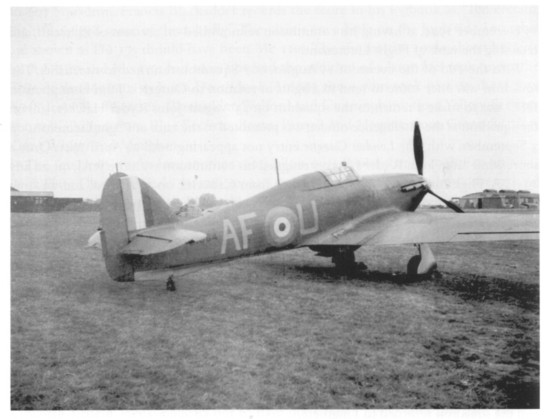 |
| Hawker Hurricane of RAF No. 607 Squadron, probably at Bicester refueling stop, approximate date 8 September 1940 (photo Will Whitty). |
US Military: The Greenslade Board departs from Hamilton, Bermuda after inspecting the new US base there, granted by the British in the "destroyers for bases" deal. It now heads back to Norfolk, Virginia.
Kingdom of Mysore: 21-year-old Jayachamarajendra Wadiyar is the new Maharaja of the Kingdom of Mysore (southern India). His father, Krishnaraja IV, has been progressive and worked with the British. Even Mahatma Gandhi has praised Krishnaraja as a "saintly king" for his progressive efforts in education and infrastructure. One could call the dynasty "Anglophiles." Mysore is a key element in the British administration of India, whose politics are very much in flux.
British Homefront: The government proclaims a national day of prayer.
Future History: Ulrich Steinhilper never became a top fighter pilot, but in the 1950s he achieved recognition in another line of work. He is credited with coming up with the phrase "word processing" (in German) while working for IBM Germany. Although apparently the phrase previously had been used here and there in the English language, Steinhilper's usage led to its mass acceptance and popularization. If anyone can be credited with coming up with the phrase, it is Steinhilper. IBM eventually rewarded him with an around-the-world cruise.
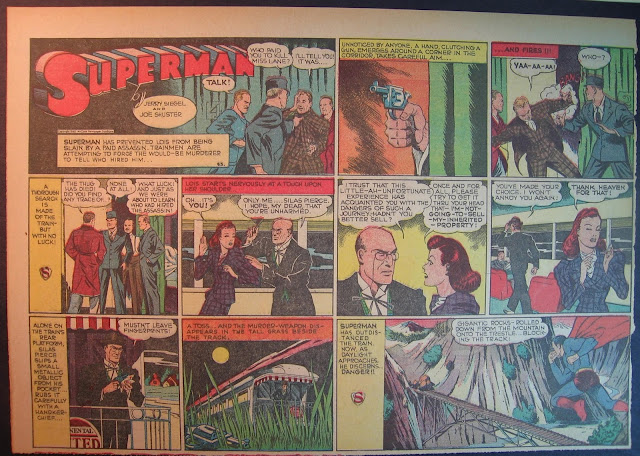 |
| Superman Sunday No. 45, 8 September 1940. |
September 1, 1940: RAF's Horrible Weekend
September 2, 1940: German Troopship Sunk
September 3, 1940: Destroyers for Bases
September 4, 1940: Enter Antonescu
September 5, 1940: Stukas Over Malta
September 6, 1940: The Luftwaffe Peaks
September 7, 1940: The Blitz Begins
September 8, 1940: Codeword Cromwell
September 9, 1940: Italians Attack Egypt
September 10, 1940: Hitler Postpones Sealion
September 11, 1940: British Confusion at Gibraltar
September 12, 1940: Warsaw Ghetto Approved
September 13, 1940: Zeros Attack!
September 14, 1940: The Draft Is Back
September 15, 1940: Battle of Britain Day
September 16, 1940: italians Take Sidi Barrani
September 17, 1940: Sealion Kaputt
September 18, 1940: City of Benares Incident
September 19, 1940: Disperse the Barges
September 20, 1940: A Wolfpack Gathers
September 21, 1940: Wolfpack Strikes Convoy HX-72
September 22, 1940: Vietnam War Begins
September 23, 1940: Operation Menace Begins
September 24, 1940: Dakar Fights Back
September 25, 1940: Filton Raid
September 26, 1940: Axis Time
September 27, 1940: Graveney Marsh Battle
September 28, 1940: Radio Belgique Begins
September 29, 1940: Brocklesby Collision
September 30, 1940: Operation Lena
2020
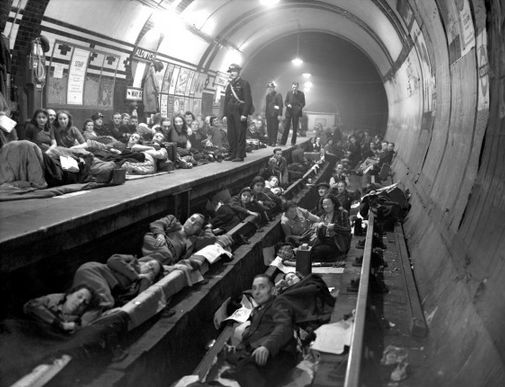
No comments:
Post a Comment